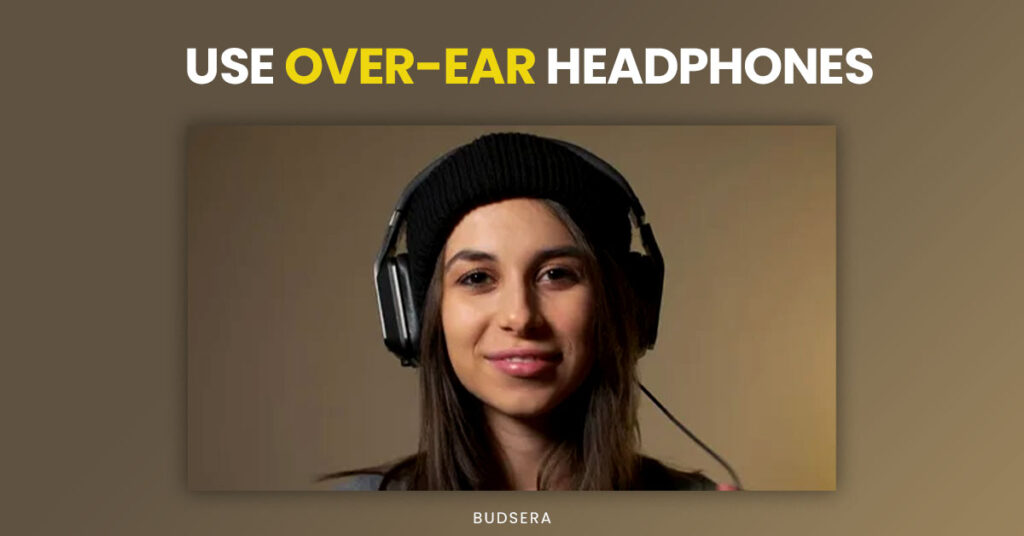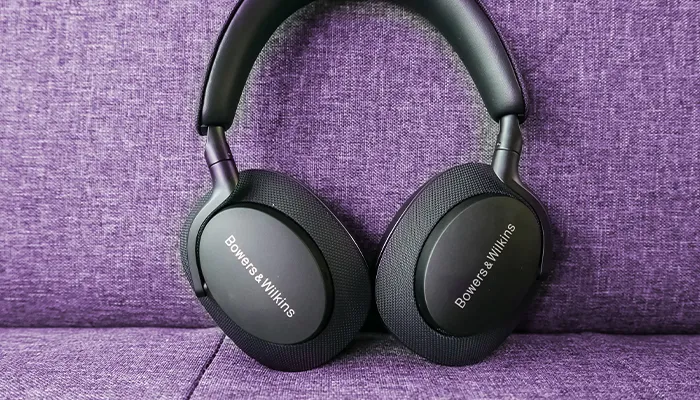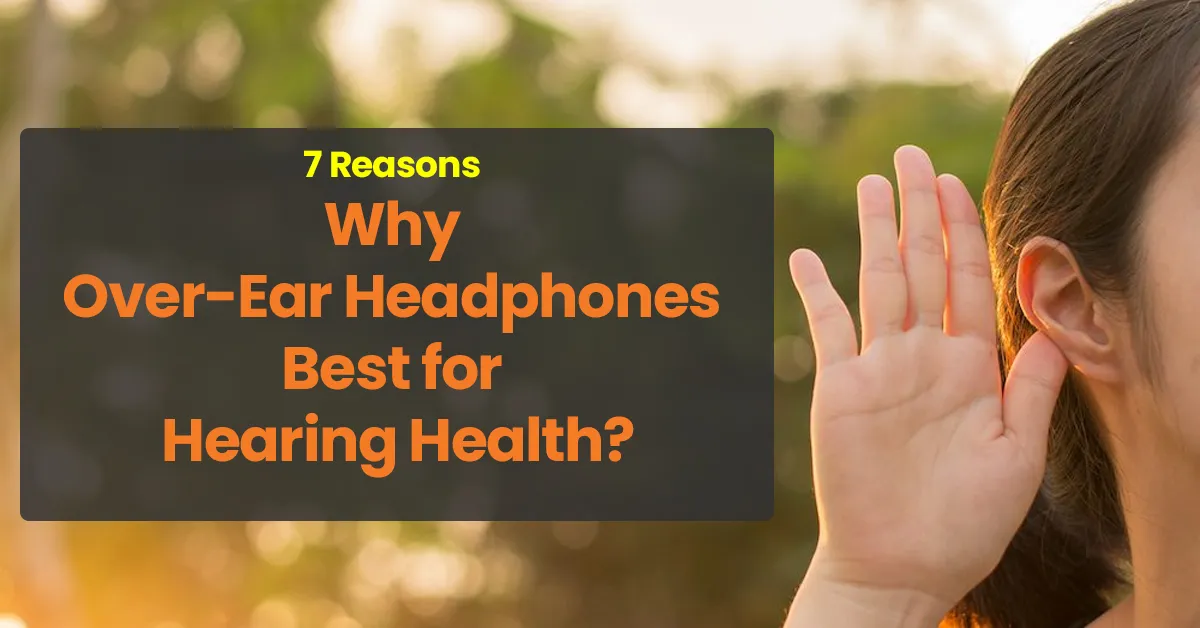Have you ever wondered whether those sleek little earbuds you wear every day might actually be damaging your hearing in the long run? You should. Studies show over-ear headphones, the big cushy kind that cover your whole ear, are better for your hearing health. Here are seven reasons why over-ear headphones are the smarter choice if you want to keep rocking out well into your golden years.
7 reasons Why Over-Ear Headphones are better for your hearing
Over-ear headphones offer several benefits for your hearing health over other options like earbuds. Here are 7 reasons why over-ear headphones are better for your ears:
1. They don’t sit inside your ear canal.
Earbuds rest right inside your ear canal, which can lead to irritation and damage over time. Over-ear headphones sit on the outer ear instead, avoiding prolonged contact with sensitive inner ear tissues. This helps prevent inflammation, trapped moisture buildup and other issues that can arise from earbuds.
2. They block out more ambient noise.
The cups of over-ear headphones surround your ears to seal out background noise. This allows you to listen at lower volumes since outside sounds are muffled. Listening at lower levels prevents long term hearing damage from loud music or audio.
3. They produce higher quality sound.
Over-ear headphones typically have larger drivers that can produce richer bass, crisper highs and an overall fuller range of sound. The spacious ear cups also give the sound more room to develop. Many audiophiles prefer over-ear headphones for their superior sound quality and audio experience.
4. They’re more comfortable for long listening sessions.
The padded cups and headband of over-ear headphones rest comfortably over your ears without irritating the sensitive ear canal. This makes them ideal for enjoying music, podcasts, audiobooks and more for extended periods without discomfort. In contrast, earbuds can become irritating over time and even painful for some.

5. They last longer.
Over-ear headphones are typically more durable and long-lasting. The solid build and components stand up well to regular use and the occasional drop or snag. As a result, a good pair of over-ear headphones can provide many years of listening enjoyment if properly cared for. Earbuds tend to malfunction or fall apart more quickly.
6. They’re safer for activity or exercise.
The secure fit of over-ear headphones ensures they stay put during activity like walking, jogging or strength training. They won’t fall out or become dislodged like earbuds, which can be unsafe and damage your device. However, over-ear headphones may be too bulky and uncomfortable for some high-impact exercise.
7. They protect your hearing in loud environments.
The noise-blocking design of over-ear headphones shields your ears from loud noises that could potentially cause damage. This includes noises from machinery, construction sites, airports, and more. While they can’t eliminate extremely loud sounds, over-ear headphones do provide more hearing protection than earbuds.

Are over-ear headphones healthier for ears?
Absolutely. Over-ear headphones, also known as around-ear headphones, are much better for your hearing health compared to earbuds or on-ear headphones. Here are some benefits of Over ear headphones.
One-size-fits-all
Unlike earbuds that come in multiple sizes, over-ear headphones fit comfortably on all head sizes and shapes. The adjustable headband and rotating ear cups provide a custom fit for any user.
Long-term wearing comfort
Over-ear headphones are designed for extended use without fatigue. They feel light on your head and the soft padding prevents soreness, even after hours of continuous listening.
Kid-friendly
Over-ear headphones are a safer choice for children than in-ear models. There’s no risk of small parts that could cause injury if left in the ear canal, and volume levels are easier to monitor and control.
Less ear irritation
The large, cushioned ear cups of over-ear headphones rest comfortably over your ears without touching sensitive ear tissue. This prevents skin irritation, itching and discomfort that can come from earbuds.

Is it better to use over-ear headphones or on-ear headphones?
Over-ear headphones, also known as around-ear headphones, are better for your hearing health compared to on-ear models for several reasons:
Comfort and Fit
Over-ear headphones typically have large, cushioned ear cups that fully enclose your ears. This provides a comfortable fit that doesn’t put pressure on your ears. On-ear headphones, on the other hand, have smaller pads that sit directly on your ears, which can become uncomfortable over time and may cause soreness.
Reduced Sound Leakage
The over-ear design creates a seal around your ears, blocking outside noise and preventing the sound from your headphones from leaking out. This allows you to listen at lower, safer volumes. On-ear headphones don’t block as much outside noise, so you may be tempted to turn up the volume to compensate, which isn’t good for your hearing.
Better Bass Response
Over-ear headphones generally provide better bass performance since they have larger drivers and the ear cups create a seal, allowing the bass frequencies to resonate. The sound from on-ear headphones tends to seem thin in comparison. Strong, boomy bass at high volumes can potentially damage your hearing over time.
Safer Listening Levels
Due to their noise isolation and full-range sound, over-ear headphones allow you to enjoy your audio at safer decibel levels. According to hearing health experts, the maximum volume level that is considered safe for long term listening is 85 decibels. Over-ear headphones make it easier to stay within that limit.
While over-ear headphones may be bulkier, the benefits to your hearing health and overall listening experience make them worth the investment.
Conclusion
So next time you’re in the market for new headphones, do your ears a favor and opt for over-ear headphones. Your hearing is worth protecting, and over-ear headphones are the best way to do that while still enjoying your music.
You’ll get premium sound quality, comfort, and most importantly, peace of mind that you’re not doing any damage by blasting music directly into your ear canals for hours on end. Take it from us, your future self with healthy hearing will thank you for making the right choice.
Over-ear headphones are absolutely the way to go if you want the best experience that won’t cost you your hearing down the line.
FAQs
- Charging Bluetooth Headphones During Use: Is It Possible? - January 9, 2024
- Why Over-Ear Headphones Best for Hearing Health? (7 Reasons) - December 12, 2023
- Fixing the Bose Earbuds Not Charging in Case Problem: Solutions That Work - November 24, 2023
